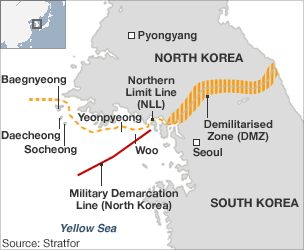Theatrical political aggression live fire political theatre
April 9, 2014
North Korea’s military fired hundreds of shells April 1 beyond their Western sea border and into South Korean-controlled Yellow Sea territorial waters. North Korea fired a total of around 500 shells, nearly 100 of which crossed into South Korean territorial waters. South Korea responded by sending nearly 300 shells into North Korean waters and sent fighter jets to the area known as the Northern Limit Line.
The exchange of fire is one part of a history of heated exchanges between North and South Korea. Nobody was injured during this particular exchange. The United States, allies of South Korea, condemned North Korea’s actions. Many groups are concerned about the tensions between the two countries as a threat to peace and stability. Others have dismissed the event as part of a pattern of North Korean political theater.
“To me, coming from South Korea, I don’t really pay attention to North Korea because this is a common thing they do to remind us that they are there,” said Sangyoub Park, professor of sociology. “It’s only barking; not biting.”
Park is one of many who have become dismissive of North Korea’s military posturing because they continually provoke hostility without precipitating any larger conflict. North Korea has a long history of engaging in military demonstrations to assert their presence in the region. Critics argue that these demonstrations are used for North Korea’s domestic politics more than foreign relations.
“To North Korea, international tension or provocation is a way of justifying to its own people that their government is protecting them,” said Bob Beatty, professor of political science in 2009, who traveled to North Korea. “North Korea does not want to trigger a war, but North Korea does want to always remind its people that they’re under constant threat from the outside world.”
At this point in time, there may be more behind the exchange than before. After Kim Jong II’s death in 2011, his son Kim Jong Un has taken power in North Korea. When Kim Jong Un first took power he was advised by his uncle, Jang Song-thaek, who acted as regent while Kim Jong Un was too young to lead on his own. December 12, 2013, Kim Jong Un ordered Jang’s execution. Kim Jong Un was also advised by a number of high-ranking military officials who he has since ordered executed or demoted.
“North Korea is in the midst of the solidification process of its new leader, Kim Jong Un,” said Beatty. “[The most recent incident of shelling] is probably a part of this process of him showing that he’s in charge.”
The exchange was preceded by a fax from North Korea demanding that South Korea control its fleet near the Northern Limit Line. It appears that North Korea had no intention of hitting any South Korean vessels. This has been the first time in recent history that North Korea has sent warning prior to live fire testing at the Northern border. North Korea’s history of live fire exercises has not always been without casualties.
North Korea sank the South Korean military vessel, the ROKS Cheonan. Forty six South Korean seamen were killed in that incident located along the same border in the Yellow Sea where the most recent exchange occurred. This history has left South Korea, the United States and China concerned about North Korea’s military demonstrations and what they could lead to in terms of regional stability.
“The North Koreans are always hesitant to go too far in either direction,” said Beatty. “You go too far in provocation and it could absolutely cripple the North Korean economy because it would cut off all foreign aid, maybe even some Chinese aid. If you go too far in accommodating the West or the U.S., then that’s not good for their domestic politics because they have to show that they are always standing up to the West.”
The most recent incident may not likely lead to a larger conflict, but the international concern over the region is valid. With Kim Jong Un looking to solidify his new role as leader, more military action may be expected. North Korea has recently expressed that they will not stop new nuclear testing, which has left the West concerned as well. This recent conflict seems to be the result of a dispute over the territorial boundaries in the Yellow Sea. South Korea seized a North Korean fishing vessel March 27, after an alleged incursion into the South Korean Territorial waters.



